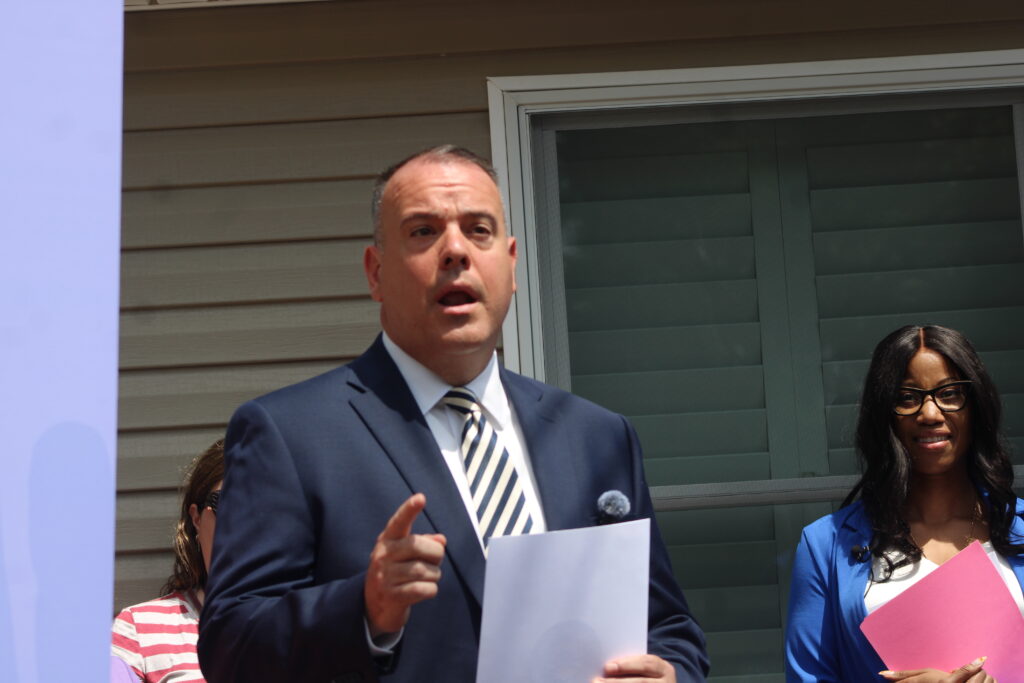Cover photo: Residents of the ‘smart’ house cut the ribbon on their new home (Credit – Matt Meduri)
Despite the drawbacks of a highly technological world, there are some incredibly beneficial features.
Such technology was on display at the first “smart” home designed for individuals with special needs was minted in Shirley on Tuesday morning, the first of its kind on Long Island. The project not only includes an entirely “smart” home, technology-wise, but by virtue of itself expands the independence and capabilities of those with special needs.
The four-bedroom Shirley residence was designed and operated by Family Residences and Essential Enterprises, Inc., (FREE). Founded in 1977, the Long Island-based non-profit supports more than 4,000 individuals with intellectual and/or developmental disabilities, mental illnesses, and traumatic brain injuries.
They provide housing, recovery services, work transitions, employments, day services, respite, crisis services, specialty health services, advocacy, and education and after-school support.
“This is a home that represents so much more than just bricks and mortar. This is a space built on vision, technology and purpose. it’s a bold step forward in what it truly means to support people in leading independent, fulfilling lives,” said Nick Ramos, Senior Vice President of Housing Services with FREE. “The people who live here aren’t just excited; they’re empowered. With adjustable appliances, voice-activated features, and a fully accessible environment designed for independence, they’re gaining greater control over their daily routines and discovering new possibilities.”
Indeed, the “smart” features can be throughout the four-bedroom residence, with Schlage coded door locks, touch screen appliances – everything from the stove, the oven, and the toaster – and hydraulic kitchen appliances, such as the sink and stove, that can be raised and lowered to accommodate various heights and wheelchair dependencies.
Even the smaller, more innocuous aspects of daily life that are run-of-the-mill for most but challenging for those with special needs are voice-activated. Raising and lowering the blinds or turning lights on or off can be completed by simply stating, “Hey, Alexa…”

Brookhaven Town Supervisor Dan Panico (R-Center Moriches) (pictured above) welcomed the four new residents to the community, what he called a “community on the rise.”
“Think about how hard it is to find housing on Long Island in general; that’s number one. Number two, to have a residence utilizing technology that’s adaptive, that actually helps the people who are inside, is really something special,” said Panico. “Kudos to FREE and for everything they do to help people’s lives.”
Councilwoman Karen Dunne Kesnig (R-Manorville), who represents the Tri-Hamlet Peninsula at Town Hall, welcomed the new residents to Shirley.
“This is an amazing opportunity for our community, both for the residents and for the community in general. Congratulations and thanks for all your hard work,” said Dunne Kesnig (pictured below).
The Town of Brookhaven cooperated with FREE to help drastically change the layout of the house, especially as far as planning and permits go. A Town spokesperson told The Messenger that the Town helped FREE to “clear all those hurdles quickly.”
FREE currently has sixty-nine homes in Nassau and Suffolk counties – although the Shirley home is the first high-tech “smart” home on the Island – and they are currently looking to expand to Maryland.
A new resident, thirty-three-year-old AJ Duran, toured the press through her new home and demonstrated the kitchen feasibility, despite her dependence on a wheelchair. Duran was able to whip up an egg by lowering the stove to her height and adjusting the temperature with a touch-screen panel right at the front of the stovetop. Duran is also known for her pasta, which she prepared on the same stove the day before.
“I’m a person like everybody else; I just have different abilities,” said Duran. “I don’t say I have a disability. I can do stuff just like any other person can do, but it might look a little different.”
Duran’s previous home was just around the corner from her current Shirley residence, but she said that the home wasn’t wheelchair accessible and washing dishes and preparing meals weren’t feasible for her.
“I had to depend on staff for help. Here, I don’t have to depend on staff for help. I can do it by myself,” said Duran, adding her favorite features of the home include the kitchen features. She looks forward to cooking and even baking, as the oven is accessible to her.
“It does feel like home,” said Duran. “If it wasn’t for this house, I wouldn’t be as independent as I am now.”
“We’re definitely looking into more assistive technology to create more independence for the people we support,” Ramos, who’s been with FREE for almost four years, told The Messenger. “We’re looking to create more of a hybrid model for our staffing for our future projects.”
Since the dawn of modern, ubiquitous technology, the common saying goes, “Isn’t technology great?” – often said sarcastically.
The same question can be asked here, although it couldn’t be farther from sarcasm.